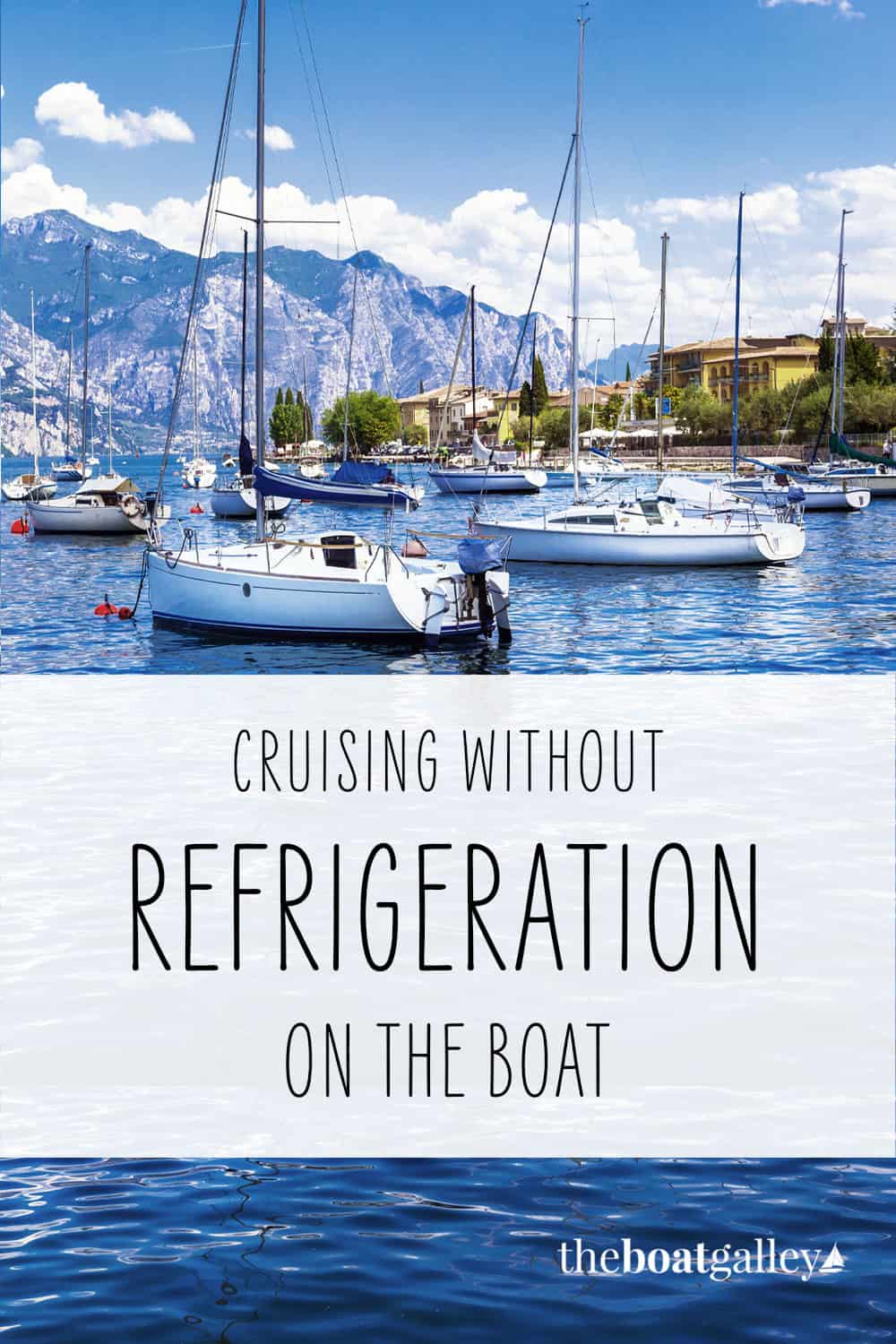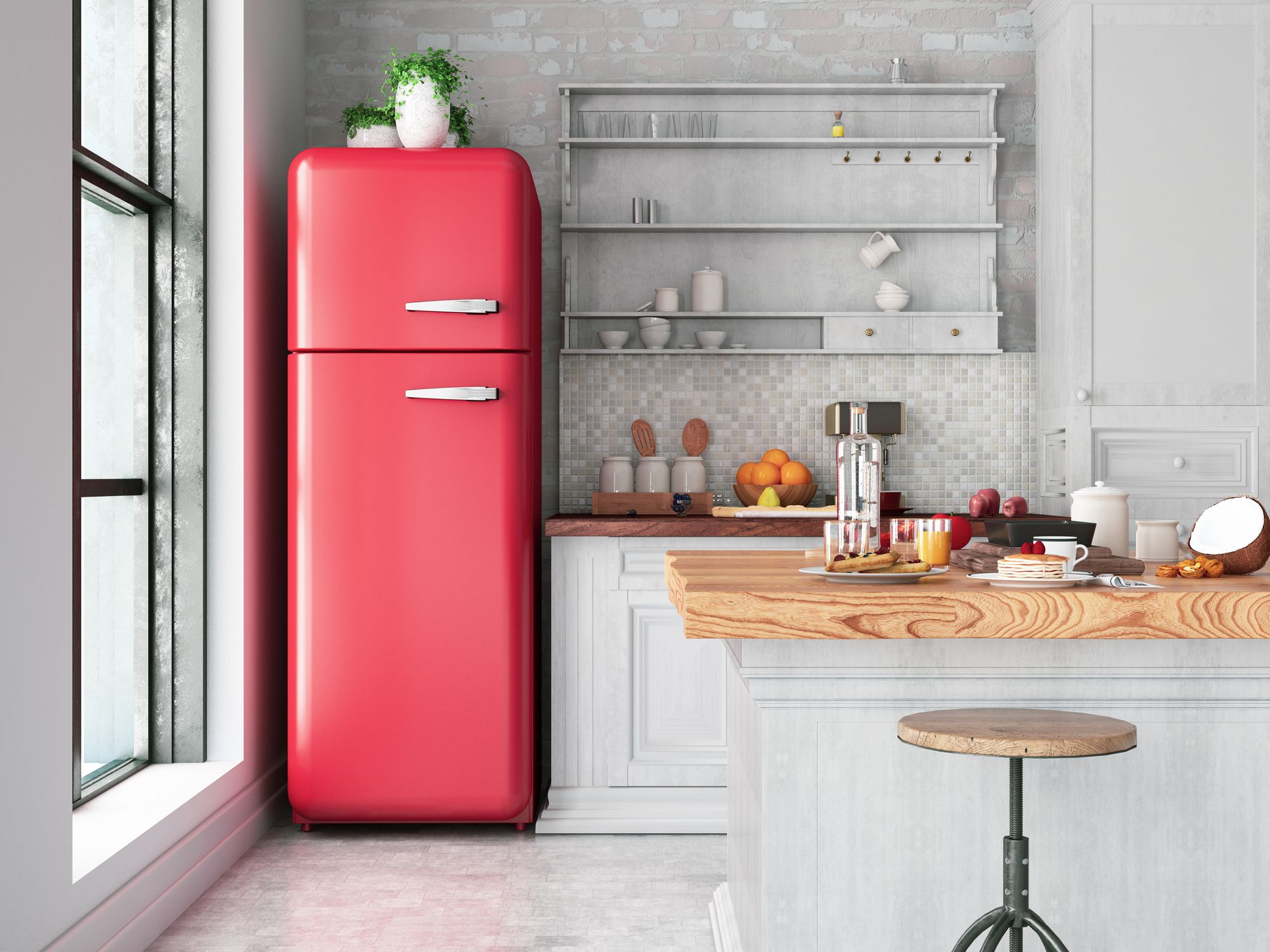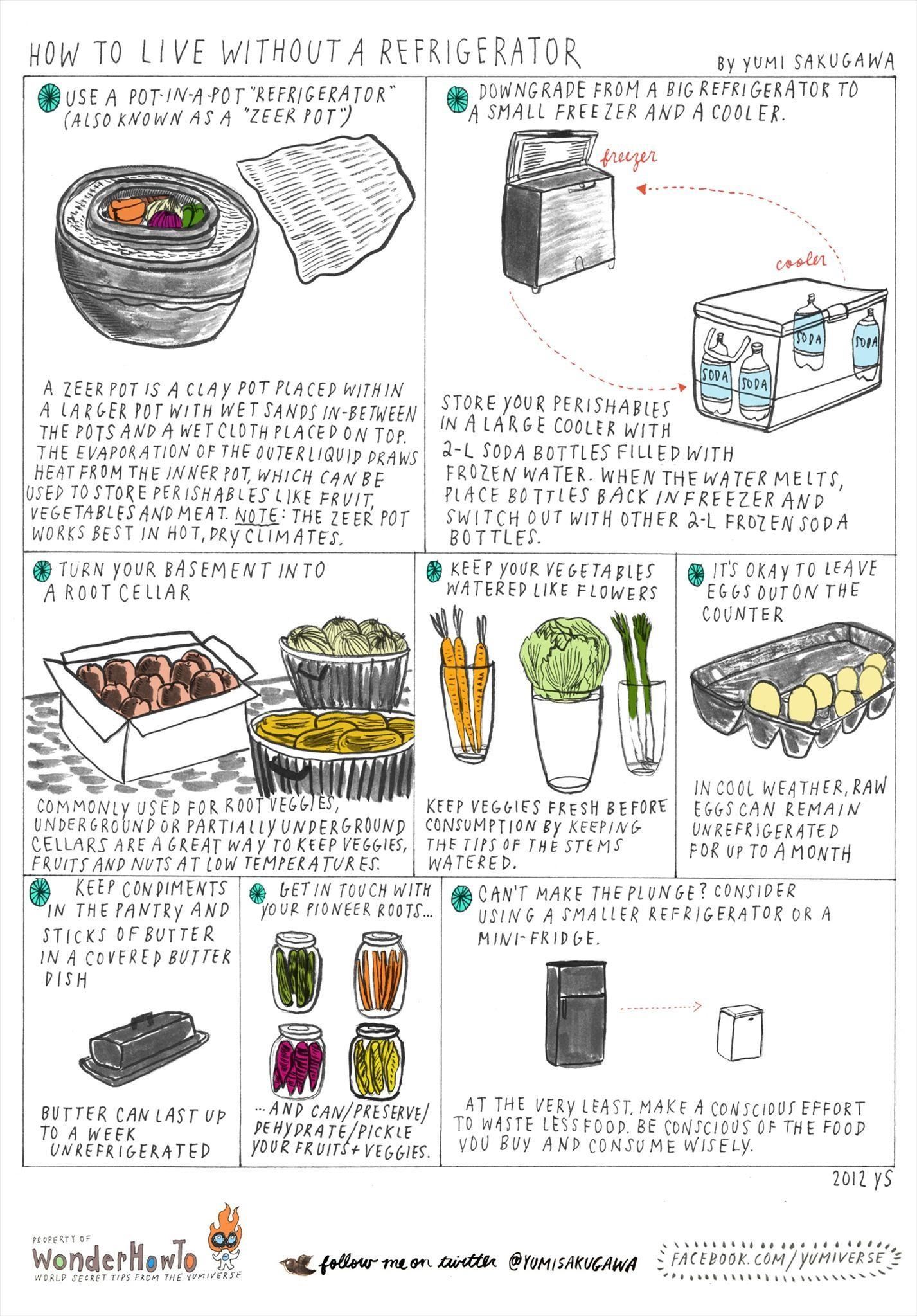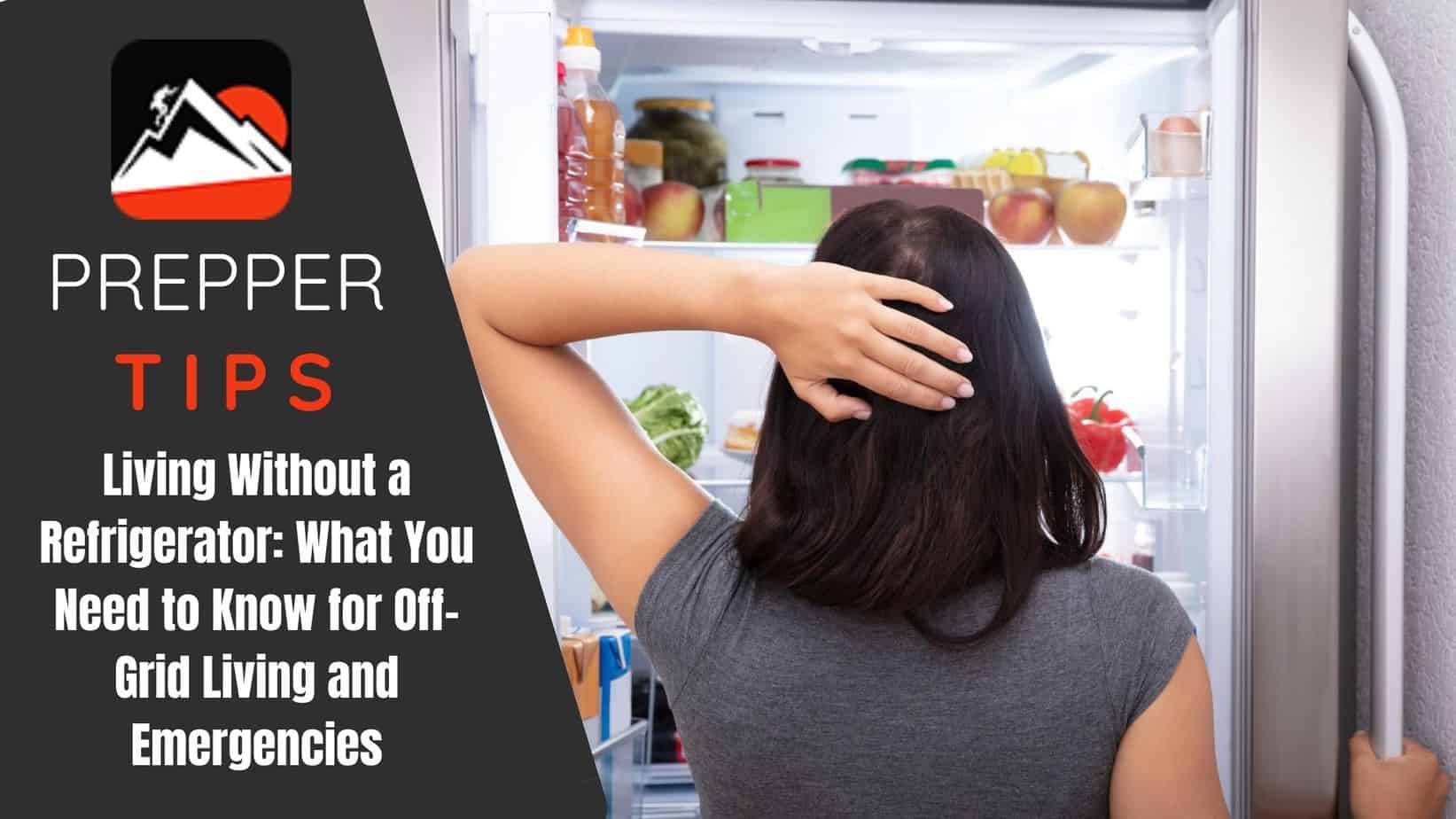
No Refrigeration The Boat Galley
Foods like canned chili or tuna can sit on your shelf for years, but frozen meals have a much shorter shelf life. When it comes to vegetables, some foods are easier to keep without a fridge. Storing lettuce is hard in a cooler, but other green vegetables, like squash and broccoli, keep well in a cooler or root cellar.

Storing Food Without a Fridge. The key to living without a refrigerator is learning how to store food properly. Root cellars, cool storage, and pantry shelves can be excellent alternatives. Vegetables like potatoes, onions, and carrots can be stored in a cool, dark place, while many fruits do well at room temperature.

Living without a Refrigerator It Can Be Done! Daily Prepper News
Keep food in a cool, dark, dry place. Potatoes, garlic, onions, apples, and many other foods will keep better this way than in a fridge. Just remember to take the food out of plastic bags. Fresh food is best stored in cloth bags or open wire mesh so gases can escape.

Living without Electricity How to do without a Refrigerator Off the
Use alternative cooling sources. Most people who go without a modern-day refrigerator still use some sort of cooling method to preserve food when needed. Simply put, cooling preserves certain foods so they last longer. Most folks who unplug their refrigerators have a backup system or plan in place, such as a zeer pot.

Kitchenaid Superba Refrigerator White Public Kitchen
Living without a fridge means I have to do that nearly every day if I buy foods that need refrigeration. I don't want to have to do that, but I will do what is necessary to feed my boy and myself. Back in the day, salt and sun-drying were the main preservation methods. Fish and beef meals were prepared using the salt and sun method.
.jpg)
ON THE VERGE Nearly ten days without a refrigerator
Living without a fridge - with a family of six. With a family of six - four young children and two adults - we spent nearly three years without any cold storage - no fridge, no freezer - and we ate well throughout that time.. You might even say I've written the book on cooking simple, home-cooked food with or without a fridge.. Seriously. It's called A Cabin Full of Food and it.

Living without a fridge Eat seasonal, Alternative energy, Green energy
Be sure to wring them out and then use clothes pins and clip them on the edge of the shelf. This will help retain moisture and provide coolness to your refrigerated food without taking up a ton of space or causing a ton of fuss. Here are more details on how to build an evaporative cooler fridge. 10. Zeer Pots.

Can You Live Without a Fridge? The Survivalist Blog
My main conclusion, which I'll unpack below, is that living without a fridge (at least in winter) is possible with minimal inconvenience. Let me begin by noting that the fridge is the only household appliance (other than a clock) that is on 24 hrs a day, 365 days a year. It takes energy to cool things, and it takes more energy to freeze things.

Cruising Without Refrigeration The Boat Galley
1. Grocery Shopping Without a Fridge: Choosing the Right Foods. Let me now share with you the secret of surviving without a fridge. It involves selecting the right foods. The solution is stocking up on non-perishable, shelf-stable goods. These consist of products with long shelf life, dry foods, and tinned goods.

7 TimeTested Ways Your Ancestors Preserved Food Without A Refrigerator
How I learned to live without a refrigerator. I lived in New York City for ten years. I had a 500 square foot rent-stablized apartment in Park Slope. Every week I lived there someone asked me to tell them if I'm planning to move. To squeeze into 500 square feet with my husband, we put our winter clothes in storage.

Vintage Refrigerator
When refrigerators hit the market in the late 1800s, it was a huge leap forward for civilized living. It offered a simple solution to the problem of bacteria-laden, disease-causing old food, not to mention the issue of losing money buying food that went bad before people could eat it all.. With all the obvious benefits of preserving food through artificial cooling, it's hard to imagine.

Are you looking for a refrigerator repair service provider… Flickr
Onions and potatoes (1 to 2 months, don't store them together) Cabbage, winter squash, and garlic (1 month if wrapped in a towel) Carrots, green peppers, zucchini (about 2 weeks, cut the tops off your carrots. Peel and soak them in water if they happen to become rubbery.) Broccoli, cauliflower, and eggplant (1 week)

Living Without a Fridge and What You Can Learn Food store, Canning
In the case of Duncan Campbell, who has been living happily without a fridge for three years, it was the food he was used to eating. Before making the switch, Mr. Campbell, 53, already hewed to a.

Living without a Refrigerator It Can Be Done! (food preservation
Living without a fridge will save you money on electricity bills and reduce your carbon footprint. How to Get by Without a Fridge. Before electricity was invented, households used cold cellars and pantries to store their food in. Food shopping was done on a more regular basis, and a lot of food was grown in the household, meaning it could often.

How to Live Without a Refrigerator « The Secret Yumiverse WonderHowTo
Lay it on its side in a shady grove and brace it on each side with boards so it wouldn't roll. Set a small piece of plywood inside over the curve of the barrel's side to create a flat shelf. Shovel snow up against the outside of the barrel, around and over it. Pack it as hard as you can and add more snow as it ices up.

Living Without A Refrigerator What You Need To Know
Most condiments will keep just fine for months without refrigeration. That includes catsup, mayonnaise, peanut butter, mustard, and relish. Other spreads like maple syrup, jams, molasses, and jellies will keep for 1-3 months. Honey can last for decades without going bad. If it crystallizes, gently reheat it.